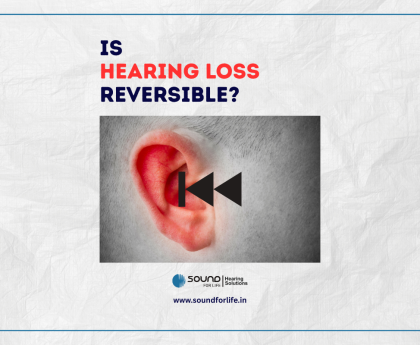If you have ever had trouble hearing, had persistent ringing in your ears, or had trouble following discussions in loud locations, you might have thought, “Who should I talk to about this?” Most people go to an ENT (Ear, Nose, and Throat) specialist, but there is another type of doctor that specialises in hearing and balance issues: The Audiologist.
People in India are still learning about audiologists. A lot of individuals don’t know exactly what they do, when to see them, or how they may assist make life better. We at SFL Hearing Solutions, think that the first step to better hearing is knowing what your alternatives are.
This article will tell you all you need to know about audiologists in India, including who they are, what they do, and when you should go to them for aid.
What is an Audiologist?
An audiologist is a healthcare practitioner that has a lot of training and experience in diagnosing, treating, and managing hearing and balance problems. Audiologists deal mostly with non-surgical ways to fix hearing and balance disorders, whereas ENTs are medical specialists who specialise on surgical or medical treatments of the ear.
What an Audiologist in India needs to have:
- Most audiologists in India have a Bachelor’s (BASLP) or Master’s (MASLP) degree in Audiology and Speech-Language Pathology.
- Some people go on to do more specialised work, research, or clinical fellowships.
They are professionally trained in things like:
- Tests and diagnoses for hearing
- Hearing aid fitting and management
- Tinnitus assessment and treatment
- Balance tests (for vestibular diseases)
- Hearing care for kids
In summary, audiologists are the professionals who help you hear better, talk to others better, and live a better life.
What does an audiologist do?
Audiologists do a lot of different things. They do more than simply give people hearing aids. Here are the main services they offer in India:
1. Tests and diagnoses for hearing
- Do pure-tone audiometry, speech audiometry, tympanometry, and other testing.
- Find out what kind of hearing loss you have (conductive, sensorineural, or mixed) and how bad it is.
- Give informative reports to help with treatment choices.
2. Suggestions for hearing aids and how to fit them
- Help you choose the best hearing aid for your budget, lifestyle, and level of hearing loss.
- Fit, set up, and personalise digital hearing aids.
- Give them training on how to use and care for hearing aids properly.
3. How to deal with tinnitus
- Assess and offer treatments for auditory disturbances such as ringing, buzzing, or hissing in the ear.
- Sound therapy, counselling, and hearing aids with tinnitus masking characteristics are all good options.
4. Tests of balance (vestibular)
- Do tests to find out if you have dizziness, vertigo, or issues with your balance.
- Give rehabilitation therapy or send people to the right place if they need it.
5. Hearing care for kids
- Finding hearing loss in babies and young children early.
- Special fits for hearing aids and activities to help kids learn how to listen.
- Advice for parents on how to help their kids’ speech and language grow.
6. Counselling and getting well
- Help patients get used to their hearing aids.
- Give people auditory-verbal treatment and instruction in how to talk to one other.
- Help people and families deal with problems with hearing.
What is the difference between an audiologist and an ENT?
People sometimes mix up audiologists with ENT experts.
Here’s a quick comparison:
It’s common to confuse audiologists with ENT specialists. Here’s a simple comparison:
| Aspect | Audiologist | ENT Specialist |
| Qualification | BASLP / MASLP | MBBS + MS (ENT) |
| Focus | Hearing and balance disorders (non-surgical) | Medical and surgical treatment of the ear |
| Services | Hearing tests, hearing aids, tinnitus, rehab | Ear infections, tumors, surgeries |
| Typical Visit | For diagnosis, hearing aid fitting, hearing rehab | For pain, infections, injuries, surgeries |
In many cases, Audiologists and ENTs often work together. If an audiologist finds a medical problem, such an infection, fluid accumulation, or a tumour, they send you to an ENT.
When Should You Go to an Audiologist in India?
Hearing loss usually happens slowly, and a lot of people don’t notice the first indicators until it starts to get in the way of their everyday lives. Here are some evident times when you should see an audiologist:
1. You have trouble hearing what people are saying.
- It’s hard to follow conversations in loud locations like restaurants, marketplaces, and family gatherings.
- People often have to say things again.
- It’s hard to hear gentle voices, like those of ladies and children.
2. You make the TV or radio too loud.
- If your family says the noise is too high, it might mean you have hearing loss.
3. Tinnitus, or ringing or buzzing in the ears
- If you hear ringing, buzzing, or hissing in one or both ears all the time or often, you should see an audiologist.
4. You Stay Away from Social Events
- If you feel uncomfortable or left out because you can’t hear well, it’s time to ask for help.
5. Hearing Loss All of a Sudden
- If you suddenly lose hearing in one or both ears, you need to see a doctor very once. Audiologists can do brief testing and send you to an ENT if they think you need one.
6. Problems with balance or dizziness
- If you have frequent episodes of vertigo, dizziness, or unsteadiness, it might be a sign of a vestibular condition.
7. Kids who are having trouble learning or talking
- An audiologist can check for concealed hearing loss if your kid doesn’t respond to noises, has imprecise speech, or has trouble in school.
Why early intervention is important
Many individuals in India put off seeing an audiologist because they are embarrassed, don’t know about it, or think hearing aids are reserved for older people. But the fact is that hearing loss that isn’t corrected might get worse over time.
- It might make you feel alone, sad, and less confident.
- If youngsters don’t get treatment for their hearing loss, it can lead to speech delays, bad grades, and trouble making friends.
- It can affect careers and relationships in adults.
The sooner you see an audiologist, the better the results will be. Today’s digital hearing aids are compact, inconspicuous, and very effective. They are nothing like the big, clunky ones of the past.
What to Expect When You Get Hearing Care in India
Hospitals, private hearing clinics, and hearing aid centres in India all offer audiology services. We put the needs of our patients first at SFL Hearing Solutions:
1. A thorough hearing test
- Full testing with the use of cutting-edge diagnostic technologies.
2. Personalized Recommendations
- Hearing aids based on your lifestyle, budget, and how bad your hearing loss is.
3. Testing and Fitting Hearing Aids
- You may check out devices before you buy them.
- The right fit and programming to meet your hearing profile.
4. Help and Aftercare
- Regular check-ins to make sure your hearing aids are working well.
- Help with upkeep and care.
5. Family Counselling
- Helping families understand hearing loss and how to help their loved ones.
Myths About Audiologists in India
Let’s clear up some misunderstandings:
Myth 1: Audiologists are just for old folks.
It’s true that hearing loss may happen to people of all ages, even kids and teens.
Myth 2: Hearing aids make you seem older.
In reality, modern technologies are small, fashionable, and frequently hard to see.
Myth 3: An ENT is all you need for hearing issues.
Reality: ENTs deal with medical problems, whereas audiologists focus on hearing care and rehabilitation.
Myth 4: There is no way to aid those who have hearing loss.
Truth: Most people may greatly enhance their hearing and speech with the correct tools and treatments.
How to Pick the Best Audiologist in India
When you choose an audiologist or hearing care centre, keep these things in mind:
Qualifications and Certifications:
- Make sure they have a BASLP/MASLP and are registered as professionals.
- Experience: Find out whether they have worked on situations like yours before.
- Facilities and Equipment: Clinics with better diagnostic instruments give more reliable findings.
- Different kinds of hearing aids: Pick a clinic that has more than one brand and model.
- Aftercare Services: Follow-up help is very important for keeping your hearing healthy over time.
- Patient Reviews: Positive reviews show that the care was good and the staff was trustworthy.
Final Thoughts
Hearing is an important part of our everyday lives, yet a lot of us in India wait until issues get really bad before we deal with them. A good hearing can improve your overall well being. Audiologists are quiet heroes who help people restore the sounds of life, reconnecting people with conversation, music, and everyday moments.
Don’t wait until it’s too late. If you feel any signs of hearing loss or notice any changes in your hearing like ringing in your ears, or trouble with your balance, consulting an audiologist at the earliest could be the first step towards improved hearing, better communication, and a better life.
Take the Next Step with SFL Hearing Solutions
At SFL Hearing Solutions, we’re committed to making reliable hearing care available across India. Our experienced audiologists offer everything from simple hearing tests to advanced hearing-aid fittings and family counselling, with clear advice, personalised plans, and dependable aftercare.
Book a consultation today and take the first step toward hearing your world more clearly.





